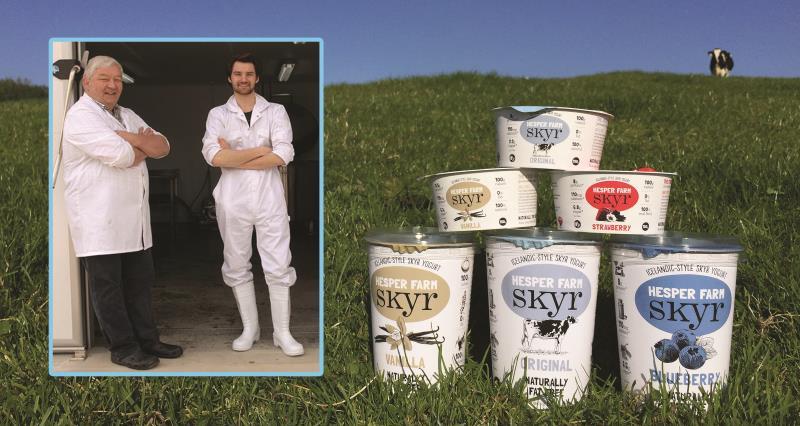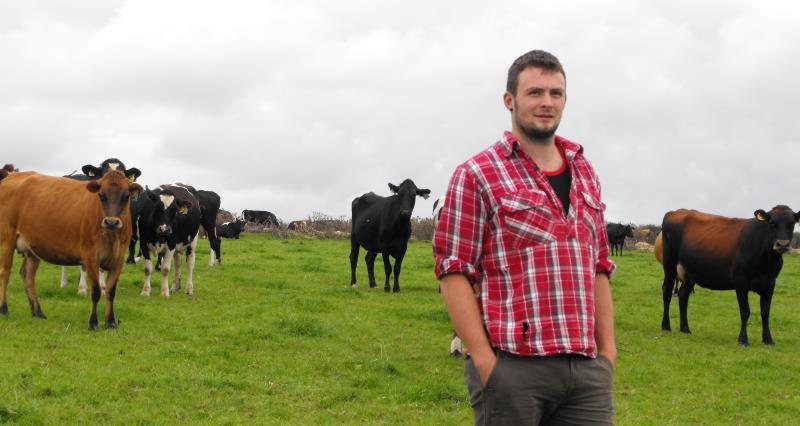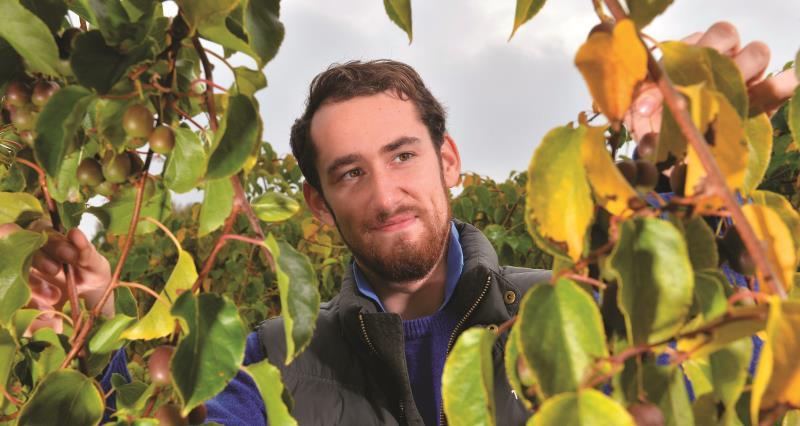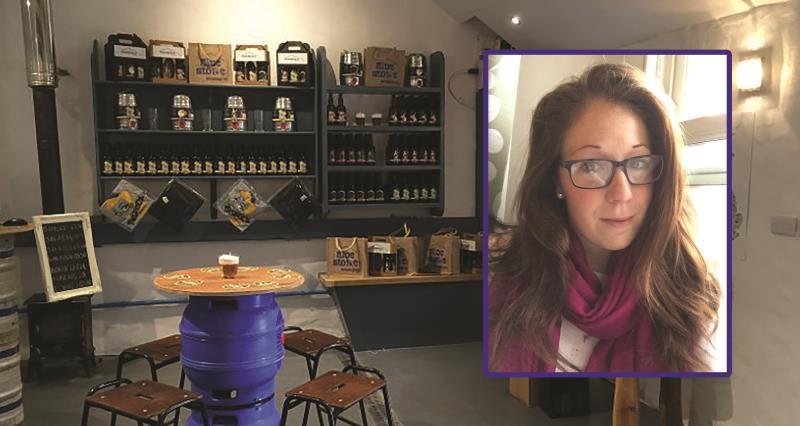And as the landscape of farming is evolving, so must those within it, and those who want to be a part of it. Student Farmer magazine met some of the newest and brightest brains in farming who are determined to break the mould and make their mark on the farming world.
Stand up and be counted young entrepreneurs of the land – let’s evolve the industry together!
AMY TURNER, 28, BREWSTONE BREWERY
Rock solid. That’s how the Bluestone Brewery describes their ale, and we think they’ve hit the nail on the head. Their decision to diversify part of their 200-acre Welsh hill farm into a brewery has turned our pretty well too.
Amy Turner (pictured above) grew up on the farm and left a job in Aberystwyth to return home and help kick start the brewery with her parents after deciding the farm wasn’t large enough to support the whole family.
With Amy’s three brothers all living abroad and no one to take over the farm, it made sense to move into something different. A quick chat with a fellow brewery owner and family friend did the trick, but it turns out they didn’t need too much convincing.
The brewery tries to do everything as natural as possible and build on the natural resources on their farm. That ethos works pretty well when you’re based in the valleys of Pembrokeshire and have your own, private water supply from the Bluestone Hills.
“We’re local people who have diversified. We haven’t moved to the area thinking there’s a gap in the market,” she said.
“We actually are local people selling local beer from a local farm.”
Their local roots will remain but the brewery are likely to go international soon, as they return from the Shanghai Trade Mission in China with high hopes that it’ll be a profitable market for them in the future.
It turns out that the Chinese “love everything British” at the moment as well, according to Amy. Point noted.
Doing the simple things like using the natural environment to your advantage is an avenue to score “easy brownie points” and any budding business should definitely do it. Bluestone feed their waste to their farm animals and dispose of any chemicals they use naturally.
They’re also unveiling a full programme for their new music venue soon. Beer and music? Sign us the hell up.
Amy’s diversification advice is simple: “The biggest thing you have to do at the start, because there are so many things to do, is to write a list and work your way through it.”
“Don’t just jump from thing to thing because you’ll drive yourself nuts.” Pretty rock solid advice.

SAM MOORHOUSE, 23, SKYR YOGHURT
Sam Moorhouse (pictured above) has been making a regular pilgrimage to Reykjavik, Iceland for around a year now. Religious reasons? No. Yoghurt reasons? Yes.
The yoghurt in question? Traditional, Icelandic Skyr. High in protein, low in sugar and low in fat makes it a big hitter with the healthy crowd.
Sam was looking for a diversification project that could take his family’s farm in Skipton, North Yorkshire in a different direction, particularly into something more stable than the ever-fluctuating milk price.
He discovered Skyr after reading an article about the Icelandic dairy industry and did what any normal, inquisitive person would do. He got a plane to Iceland and wandered around Reykjavik asking if anyone knew how to make the yoghurt. Standard.
That’s where he found Thorarinn Sveinsson who showed him the ropes of how to make the traditional product. He owns a Skyr factory in the North of Iceland and Sam went to work there for a week, getting hands on with the product.
Next task: convincing his parents.
“My parents were having none of it,” Sam said.
“I paid for a lot of the initial stuff myself so I was doing it off my own back. At that point they were letting me have a meeting with the bank manager. If I couldn’t convince anyone else to give us the money it wasn’t going to happen but luckily I put together a business plan and a marketing strategy.”
With no business background, it was pretty tough to get his head round the whole process of securing funding, marketing and all the other intricacies that come with starting a new venture.
Learning as he went along, Sam’s advice for anyone giving diversification a go is that you have to do your research.
“If you’re thinking of doing anything whether it’s a product or service, you have to 100% research the market and make sure before you make that investment that there is a market for it,” he said.
For Sam, it’s all about getting Skyr out into the market and as many places as he can. His approach is simple: reach the maximum capacity of his current building and then take it from there.
No doubt he’ll continue to bring a little part of Icelandic culture to Yorkshire, and hopefully beyond.

SAM BULLINGHAM, 24, DAIRY FARMER
You’d be called mad if you decided to leave your field less than a year after winning a world title, but Sam Bullingham (pictured above) has gone against the grain and left his comfort zone working with sheep and jumped straight into the world of dairy.
Crowned the ‘Young Shepherd of the Future’ and part of the England team that took top prize at the World Young Shepherd Challenge in 2014, Sam began contract heifer rearing only a few months after his victory.
Working in Bodmin, North Cornwall, the switch to dairy has coincided an opportunity to partner up with another farmer and potentially rent a farm between them.
“If you’d asked me six months ago if I wanted to start milking cows I would have said definitely not, thank you very much,” Sam said.
“You just have to give these things a go. If I said I didn’t want to do any of these things in dairy I would have missed this opportunity. It might turn out I enjoy dairy more than sheep. You can’t knock it until you try it.”
Sam still has his flock of 200 Romney sheep at his home in Okehampton, Devon and has done what any sensible brother would do and got his sister to look after them while he’s not there.
With the cows in a grass-based system and only being milked once a day, it’s not a million miles away from his sheep operation but he says the dairy is easier on his body.
“The sheep was harder to be fair. It’s more physically demanding, that’s how I would describe it. Everything you do with sheep, it doesn’t matter how mechanised your system is, you still have to handle them,” he said.
Changing what you work with or the sector you work in would be pretty daunting to most so we got Sam to give some advice on why you should explore your options and give it a go:
“I would say to try it first. Before I got committed or involved down here, I came down and did around 15 milking’s before I committed to making a decision that it was something I wanted to do,” he explained.
“It’s all knowledge. You have to speak to people about their experiences. No one goes in, unless they’re a bit silly, without looking into it a bit first.”
So if a world champion can leave his field of expertise, anyone can.

NICK LEEDS, 22, KIWIBERRY FARMER
A new crop is a lot of work. Just ask Nick Leeds, because he’s the man in charge of growing the kiwi berry at Wither’s Farm in Herefordshire.
You might not have heard of the kiwi berry. That’s alright – neither did we at first. Let us fill you in.
It’s about the size of a grape, doesn’t have hairy skin, and tastes like a kiwi. Pretty cool right?
Nick heads up a small team on his family’s 350-acre fruit farm in Ledbury in Herefordshire where they are producing 11 tonnes of the fruit from only 17 acres. He’ll tell you that there’s plenty to contend with when growing something new on the farm.
The pruning and spacing were all issues when Nick and his dad George began growing the berry back in 2008, but they’ve got it down to a tee now and the fruit is proving to be pretty popular, being stocked in 200 Waitrose stores across the country this year.
Even with most of the techniques figured out, it can still drive Nick mad.
The branches tangle, A LOT. This means he has to spend a lot of time untangling them, before they tangle again. Infuriating.
“By the time you’ve finished untangling the whole field you have to go through and do it again. It’s constant untangling,” Nick explained.
“If you don’t do the untangling you suddenly realise what you’re faced with and it took a while to realise. We haven’t allowed that to happen and these look quite neat and tidy and this year has been really quite good.”
With the nation becoming increasingly conscious about their health and waistlines, diversifying into a product that is packed full of antioxidants and vitamins and is considered a super-fruit is a pretty sound idea.
This super-fruit is pretty versatile too. Nick says that they’re good in a smoothie, in chutney or as a sauce to go with fish.
As well as taking care of the fruit, Nick also studied business studies at the University of Chester. Not one to waste a good opportunity, he used his responsibility of heading up the fruit as the topic of his dissertation.
Even though the kiwi berry is a niche fruit, Nick and his team at Wither’s Farm show that it’s still possible to introduce new produce to the market.
Currently travelling through the United States and down through South America, maybe Nick will be on the lookout for something he can bring onto the farm and British shelves in the near future.
Young farmer? Apply for our industry programmes below:
- Poultry Industry Programme - find out more here
- Sugar Industry Programme - find out more here
- Cereals Development Programme - find out more here
